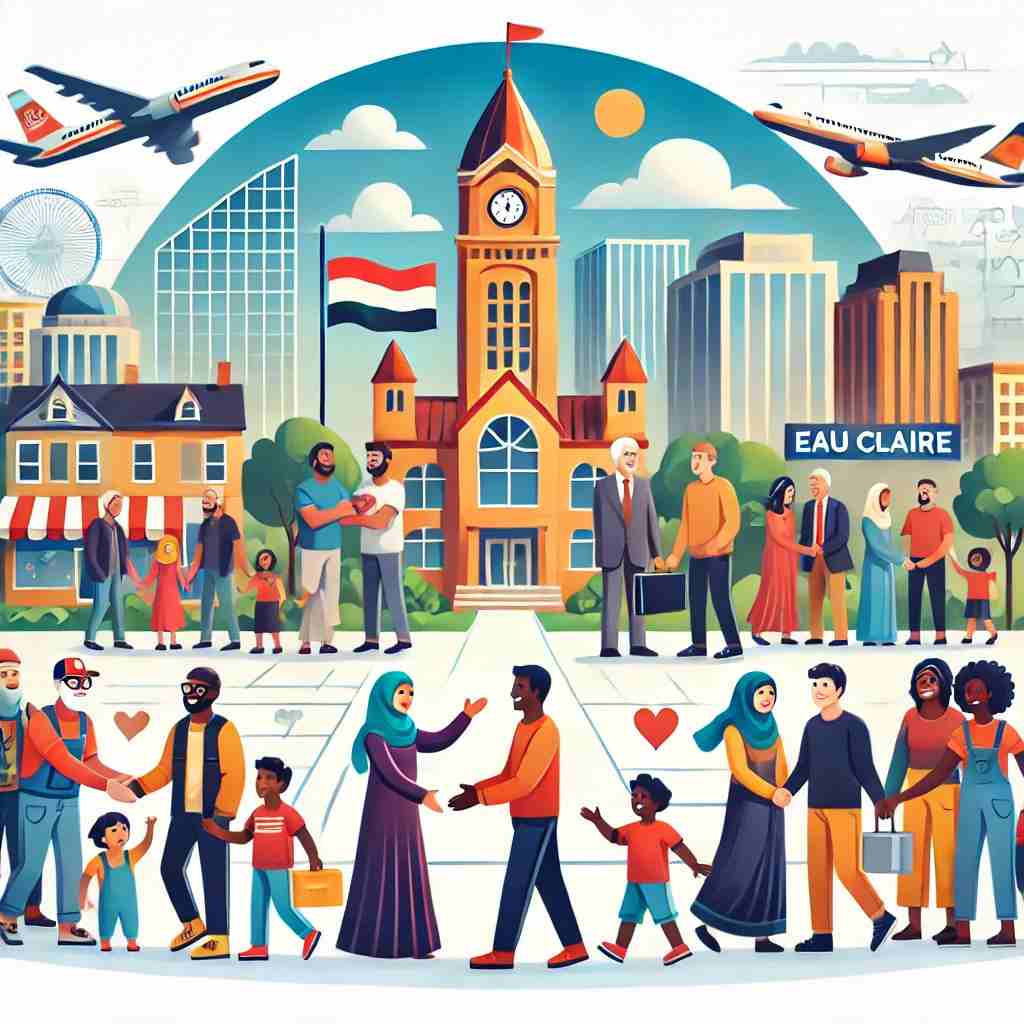Refugee Resettlement Eau Claire Tensions:

Eau Claire, Wisconsin, has become a focal point for discussions surrounding refugee resettlement, a topic that has sparked both support and opposition within the community. This initiative, spearheaded by World Relief Wisconsin, aims to resettle 75 refugees in the area, primarily from Myanmar and the Democratic Republic of the Congo. While the program has received enthusiastic endorsements, it has also generated concerns among some residents and local officials, creating a nuanced debate about inclusion, safety, and community cohesion.
The Support for Refugee Resettlement:
Proponents of the refugee resettlement program highlight the humanitarian aspects and the positive impact refugees can have on the community. One of the most vocal supporters is Eau Claire City Council member Josh Miller, who emphasizes the importance of empathy and inclusivity.
He stated, “Can you imagine having to flee your homeland, live in a camp for who knows how long, and move to a new country and upon arrival hear you aren’t wanted.” Miller and others advocate for the welcoming of refugees as an opportunity to demonstrate Eau Claire’s values of compassion and cultural enrichment.
Miller’s sentiments are echoed by many community members who view refugee resettlement as a way to foster a more diverse and supportive environment in Eau Claire. Supporters argue that refugees contribute to economic vitality, cultural diversity, and social integration. In addition, organizations like World Relief Wisconsin provide critical support in helping refugees access education, healthcare, and job opportunities, ensuring a smoother transition into American society.
Furthermore, the Eau Claire City Council unanimously passed a resolution reaffirming the city’s support for the refugee resettlement program. This move underscores the city’s commitment to diversity and inclusion, positioning Eau Claire as a community that values helping those in need. City leaders have pointed out that welcoming refugees aligns with the city’s history of inclusion and its dedication to embracing individuals from all walks of life.
Concerns and Opposition:
Despite this broad support, some residents and local officials have expressed concerns about the resettlement process. Critics argue that the community was not adequately informed, and that the process lacked sufficient public input. This lack of transparency has led to unease among some community members, who feel that decisions were made without fully considering the views of those who will be most impacted.
U.S. Congressman Tom Tiffany voiced concerns over the potential risks posed by refugees who may not have undergone thorough vetting processes. These apprehensions have led to calls for a more cautious approach, with some suggesting a pause on resettlement until additional scrutiny can be applied. Tiffany and others have raised alarms about security risks, though supporters argue that rigorous vetting processes ensure that only those who meet stringent criteria are resettled.
In response to these concerns, the Chippewa County Board advanced a resolution calling for a temporary halt on resettlement efforts until an independent economic impact study is conducted. The resolution reflects a desire for a deeper understanding of the implications of refugee resettlement, particularly in terms of its economic and social effects on the local community. Proponents of the resettlement program have responded by emphasizing the positive long-term outcomes, including increased community engagement and diversity, which can benefit Eau Claire as a whole.
Balancing Inclusion and Practical Considerations:
The debate over refugee resettlement in Eau Claire is emblematic of broader national discussions about immigration, integration, and community cohesion. While the humanitarian aspect of resettlement is widely supported, balancing this with practical concerns is a complex task. Local officials, community organizations, and residents must navigate the delicate balance between providing support for newcomers and ensuring the safety and well-being of existing residents.
Moreover, addressing the concerns of all community members is essential to building trust and fostering a welcoming environment. Ongoing dialogue, coupled with transparent communication, is key to ensuring that the resettlement process does not deepen divisions within the community. By creating spaces for open discussions, Eau Claire has the opportunity to set an example of how communities can successfully integrate newcomers while preserving the social fabric of the local population.
The Future of Refugee Resettlement in Eau Claire:
As the refugee resettlement program in Eau Claire continues, the focus will likely shift toward implementation and integration. Efforts will be needed to provide refugees with the necessary resources—such as housing, education, and employment opportunities—to thrive in their new community. At the same time, ongoing assessments and community engagement will ensure that both newcomers and residents benefit from the resettlement process.
Local organizations, such as World Relief Wisconsin and community groups, will play a pivotal role in facilitating these resources and fostering connections between refugees and the existing community. By promoting inclusivity and offering support services, these organizations help create a more cohesive community where diversity is celebrated rather than feared.
FAQ’s:
1.What types of refugees are being resettled?
The refugees resettled in Eau Claire primarily come from countries like Myanmar and the Democratic Republic of the Congo, who have faced significant challenges and instability in their home regions.
2.Are refugees thoroughly vetted before resettlement?
Yes, refugees undergo a rigorous screening process, including background checks, interviews, and health assessments, conducted by U.S. government agencies to ensure the safety and security of local communities.
3.How does refugee resettlement benefit the community?
Refugee resettlement brings diversity, cultural enrichment, and economic contributions to the community, along with access to resources like education, healthcare, and job opportunities for newcomers.
4.What steps are being taken to address concerns about resettlement?
Local leaders are engaging in community dialogue, ensuring transparency, and conducting economic impact studies to address concerns about refugee resettlement and its impact on the community.
5.Why is Eau Claire resettling refugees?
Eau Claire is resettling refugees to provide safety, support, and opportunities for individuals who have been displaced from their home countries due to conflict, persecution, or other hardships.
Conclusion:
the discussion surrounding refugee resettlement in Eau Claire highlights the multifaceted nature of immigration and community support. While there are differing opinions and concerns, the city’s dedication to fostering an inclusive environment remains steadfast. By continuing to engage in thoughtful dialogue and practical solutions, Eau Claire can serve as a model for how communities can successfully embrace diversity and create spaces where everyone feels welcomed and valued.




